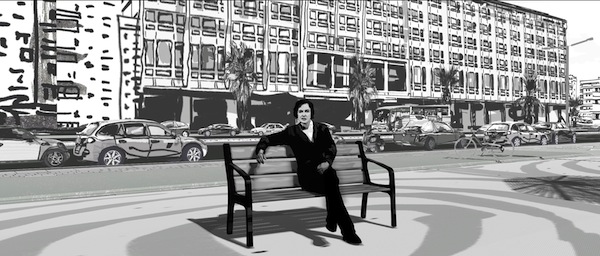Lili Tepperman is one of five kids featured in Beauty. (photo from NFB)
It’s fine to be who you are,” says Bex Mosch, who turned 9 years old last year, when Beauty was released. Since the age of 3, Bex – formerly Rebecca – says he has known that he is a boy. He and the other “gender-creative” kids interviewed in Christina Willings’ 23-minute documentary have been forced by circumstances to become more mature than most kids their age. And they have more nuanced views on what it means to be human than many adults.
Beauty has its local première during the Vancouver Queer Film Festival’s first short film program, called The Coast is Genderqueer, which takes place Aug. 17. In addition to Bex, Fox Kou Asano, Milo Santini-Kammer, Montreal Jewish community member Lili Tepperman and Tru Wilson are interviewed. Interwoven with the interviews, footage of the kids being kids and meeting their families briefly, parts of Beauty are animated. These illustrations depict some of the kids’ favourite interests and tie together some of their common experiences. None of the parents is interviewed.
“In a way, the concept of this film came to me in the early ’80s,” says Willings in an interview on the NFB media site. “I was thinking a lot about the deconstruction of gender at that time, as were many others. We examined it from every angle, but what’s new now is that it’s children who are leading the conversation, who are saying, ‘Hey! Something’s wrong here!’ Some compassionate, and I would say enlightened, parents are hearing them. The new conversation isn’t ideologically driven, it’s experiential, and there’s a profound purity about that. It’s a breakthrough that I have felt very moved and honoured to witness and, by 2012, I realized this shift was going to be the subject of my next film.”
All of the five interviewees have had to face serious challenges, from being laughed at to being bullied. And, of course, they have had to talk with their parents about how they see themselves, versus how their parents initially viewed them.
“Sometimes, it’s easy to think it would be less stressful just to fit in,” says Lili in the film, “but then I’m not really being myself, and I find that’s an important part of living life because, if everybody’s trying to be like everybody else … it doesn’t make any sense to me.”
Beauty screens Aug. 17, 5 p.m., at SFU’s Goldcorp Centre for the Arts. For tickets, visit queerfilmfestival.ca/film/the-coast-is-genderqueer.
* * *

Another NFB film being screened in Vancouver next month is Wall, which is based on British playwright David Hare’s 2009 monologue on the security fence/wall between Israel and the Palestinian territories. Wall is not the first extended exploration of the Israeli-Palestinian conflict for Sir David, who was knighted in 1998. Written in 1997, his Via Dolorosa monologue premièred in London in 1998.
The film Wall has been a long time in coming. According to the NFB media site, in 2010, NFB executive producer and producer David Christensen “had a three-hour drive ahead of him when he chanced upon a podcast of Wall.”
“‘Listening to David Hare’s take on this wall Israel had put up gripped me visually,’ recalls Christensen.
“Riveted by Hare’s reframing of the issue and struck by how he could visualize the piece as an animated film, Christensen immediately called his producing partner Bonnie Thompson, who had the same reaction he did upon listening to Hare’s piece.
“‘For many of us, the issues around the Middle East, Israel and Palestine are complex and polarizing,’ says Thompson. ‘We thought making an animated film was a way to better understand this wall.’”
Canadian filmmaker Cam Christiansen is the animator who brought the concept to life visually, using 3-D motion-capture footage and other “cutting-edge animation tools.”
Wall has been the official selection of six film festivals to date, so it has captured critics’ imaginations. However, most Jewish community members will find it hard to watch, as Hare pays lip-service to the complexity of the situation but never veers very far away from blaming Israel for pretty much everything. When he says, “words become flags. They announce which side you’re on,” anyone with a basic knowledge of the Israeli-Palestinian conflict only has to look at the title of this work to know on which sides he falls. But then he goes on for 80 minutes about it.
There are a few instances when Hare seems about to offer the Israeli side, or at least condemn Hamas, but then he retreats. When he is told about a Hamas torture tactic, he is at first repulsed but then suggests it’s a metaphor for how Palestinians must feel at the hands of Israel. When he sees a poster of Saddam Hussein in a Ramallah café, he wonders about the appropriateness of such a man as a hero but then concludes it’s OK because Israel put up the wall, after all. And, then there’s his exchange with a Palestinian who says that Britain is to blame for all the problems: “Of course it’s your fault. The British were running Palestine in the 1940s. When they ran away and left everything to the Israelis, they didn’t care what happened to everyone else. There was a life here – a Christian life, a Muslim life, a Jewish life – and that life was destroyed.”
This ridiculous statement – and so many others – is not only left unchallenged by Hare or any of the filmmakers, but gets nods or words of understanding. With Israeli novelist David Grossman as the predominant voice defending or explaining Israel’s motivations and actions in Wall, most Jewish movie-goers will know before seeing it just how limited are the views expressed in this film, no matter what complexity it proclaims to convey.
Wall screens four times between Aug. 17 and 21 at Vancity Theatre. For tickets, visit viff.org.

